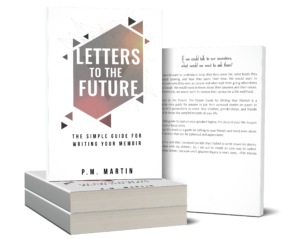Posted by Helen on Jul 02, 2019 in Creativity, Writing, & the Arts
Why Write Your Memoir?
Many writers are drawn to memoir writing because they’ve had one sitting in the back of their heads for a while; they leave their personal stories packed neatly in the boxes of their minds to be unpacked someday. The drive to pass on our knowledge is a strong one that many people identify with, especially as they age.
But, you don’t have to consider yourself to be a writer to be interested in memoir writing. For people who write occasionally, or who do not consider themselves to be writers at all, there is a keen interest in collecting personal stories to share with future generations. Everyday people—farmers, accountants, and furniture salespeople—all have stories to tell. Where were they born? How well did they get along with people? What inspired them? What were their hobbies? What did they value?
We all have a story to tell—practiced writers and non-writers alike. Our stories are what make us who we are, because they help us to define our experiences through the lenses we use to process our adventures. Everyone has stories to share, and now is the time to start to explore memoir writing and begin to tell your story.
How to Get Started with Memoir Writing: Organizing and Processing Our Experiences
Writing your personal stories helps to make sense of events from the past. With time and maturity, the process of looking back at the past can be easier for many people. Writing about your life events can support a more accurate sense of when different things happened, who was involved, and what the outcomes were. By writing about your past, you develop context for it, explanations for what happened, and recognize outcomes that you could not see at the time.
Additional Benefits of Memoir Writing
- Improving Memory
Oftentimes, when a person begins jotting down the details of a life well lived, some of the bits and pieces seem to have fallen out of view. The process of collecting information about the past—brainstorming, taking notes, writing down memories, and composing whole stories—they work together in a way that improves your memory. After working with the writing process, even if all you do is jot down notes of what you remember in the moment, new details emerge. A person’s memory improves by practicing remembering. The sights, sounds, shapes, and textures in events become clearer. The events from your past can become clearer and you can remember more just by writing.
- Increasing Confidence
When you were young, did people make fun of your name, kick sand in your eye, or play jokes on you? Most people experienced some kind of sophomoric behavior from their peers, and in many cases it takes a bite out of one’s self esteem. No one likes being belittled, but luckily, people grow up and most of them learn how to behave. Happily, most memoirists find that when they write about the sad events from the past, the pain dissipates and their confidence increases. Writing about the past allows writers to know that past events happened but the marks they left were temporary. Today is a new day that can be lived with full confidence.
- Making Peace with the Past
When we write about the past, we can process the details of earlier events and judge those involved from a distance that allows us to be less emotional. We can make peace with our pasts by writing about those times. Research dating back to the 1980s consistently demonstrates that writing about one’s past events, including the challenging times, encourages writers to dig deep into the closets overflowing with skeletons and write every word. We can rewrite events to include sections on: what I wish I had said, if I had the chance to do it all over again, and the three changes I would have made. This allows us to take charge of the incidents of our lives and rework them in a way that we can make peace with them.
- Reconnecting with the Important Events
If I could relive any events from my life, it would be the birth of my children. Those days were the most emotionally overwhelming, physically exhausting, and exhilarating episodes of my life. I could write and rewrite and write again the details of the pain and anguish and joy and love from those awe-inspiring moments. We all have days that would be heavenly to be trapped within. If you could just relive your best days on Earth. Writing lets you do that. It lets you relive the past, it lets you reconnect with the red letter days, and it lets you capture the mindset, the vision, and the memories of the most beautiful days of your life.
What do Readers want?
What do reader want to read? What readers want is to connect to other people through the magic of story. They want to get to know the writer, the want to know what happened, and they want to uncover the truth. When a reader chooses to pick up a memoir, they are seeking out the answer to who the person is. Readers want to read deep, personal narratives. They want to know about your life.
- Friends and Family Want to Connect with You
People who grow up with a clear understanding of their family tend to be more certain of who they are. They know where they come from and seem to have an easier time figuring out where they are going. When grandparents, aunts and uncles, and family friends take the time to collect their personal stories, they are helping young people to establish an understanding of who they are in the world. Personal stories build confidence for the writer and the reader.
- The Experiences of the Everyday are Valuable
People sometimes think that memoirs are only interesting if they are about extraordinary events like climbing mountains or great discoveries. Not true. Not only have historians used the journals, letters, and personal stories of everyday people to establish what happened during historical events, but so do other people. Gardeners learn different techniques by reading the journals of the last generation’s green thumbs. Fashion designers read the notes from last century’s seamstresses to understand intricate stitching. And grandchildren recognize where their love of antique book collecting or bird watching came from by reading the personal stories of their ancestors.
- Young People Feel More Grounded and Connected Knowing about Family
Young people spend a significant amount of time figuring out who they are as individuals. They wonder if they are like their parents or their grandparents. They are curious where their dominant traits and viewpoints came from and whose lives they can emulate to be happy. Young people are on the hunt for themselves and are desperate to find deep personal connections within their friends and family.
When an adult takes the time to share personal stories, they create a pathway for young people to follow as they search for themselves. Memoir narratives help young people seek out connect, understand their value, and decide who they are and who they want to do. The young people in your life: children, grandchildren, nieces and nephews, and family friends need your stories to feel whole.
Memoir Writing: It is Awfully Fun!
Yes, memoir writing can be therapeutic. Yes, memoir writing can be personally fulfilling. Yes, memoir writing can help improve memory, can resolve old grudges, can increase confidence and self-esteem, and can help readers connect with the memoirist. Memoir writing is a multi-layered genre that supports our personal and creative development on so many levels. And at the end of the day, it is just good fun. People who collect personal stories and write their memoirs reflect positively on how much they enjoy the process and how much they gained from it. Not only is it good for you, it is awfully fun.
Patty Martin teaches Letters to the Future: A Guide for Writing Your Memoir at Colorado Free University. Join her to learn a way of bringing your story onto paper. Next session is on August 17th, 2019.
Learn about Colorado Free University Registration Policies here.

